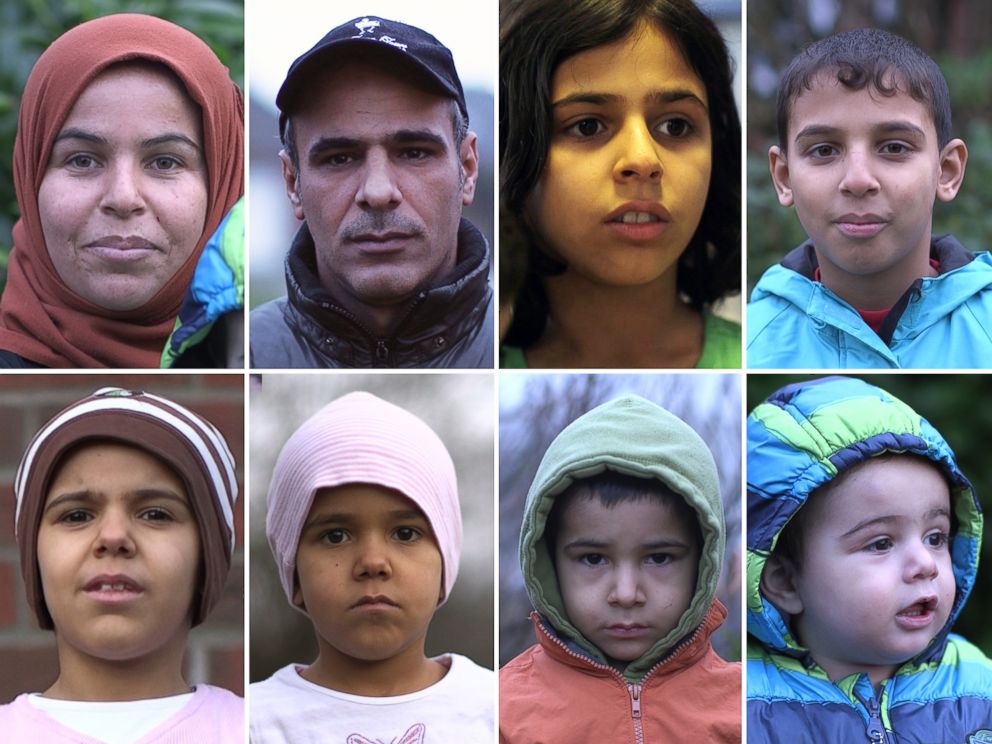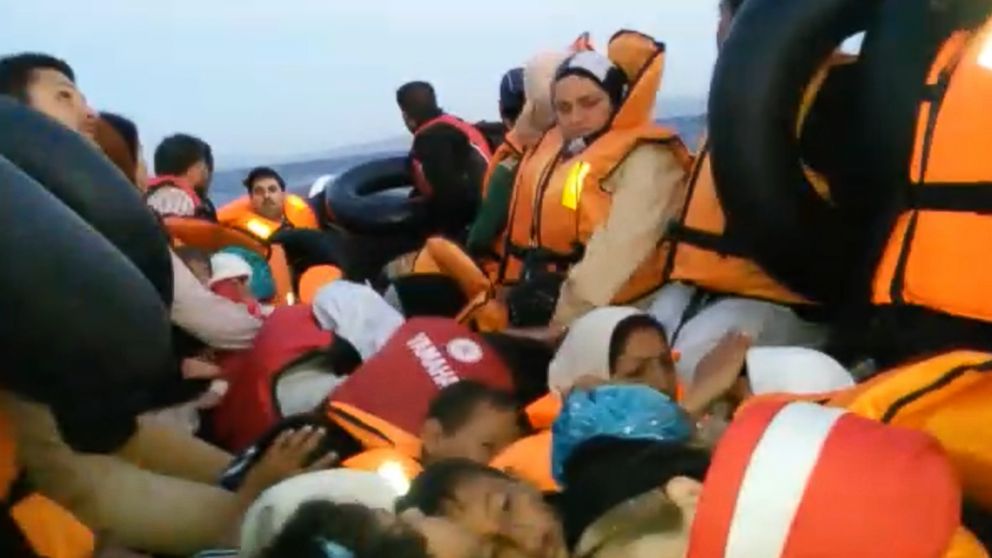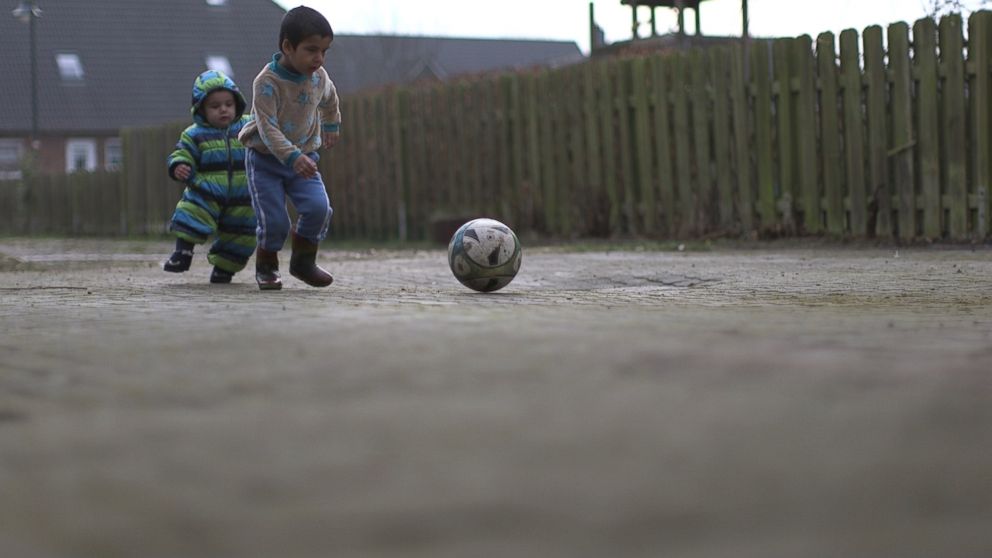Syria Refugee Crisis: How One Lucky Family Survived the 'Journey of Death'
Six kids. 2,500 miles. One chance at a new life.
HATTSTEDT, Germany— -- Batoul Hilel, 30, ran as fast as she could. Six months pregnant and wearing sandals, tears streaming down her face, she ran toward the airstrikes battering the neighborhood where her children played.
“I expected one of my children to be dead,” she says. "Absolutely."
The airstrike missed by a few yards. All five children survived.
“After that, I had enough,” Batoul says. “I had to leave. So we decided we would leave for Turkey and never return to Syria.”
At 4 a.m., she told her children they were going on a trip. She packed the necessities and left the wedding albums. They rolled into Raqqa, Syria around sunrise, and by sunset, they had crossed the Turkish border.
It was Sept. 10, 2014. Born and raised in Deir Ezzor, a strategic city in eastern Syria on the banks of the Euphrates River, Batoul had never set foot out of Syria. Now, she was leaving alone with five children under the age of 10, in the middle of the night.

Reunited with her husband Laith, 31, in Turkey, a sixth Hilel child was born in a refugee camp: Fahed, now 14 months old. Batoul turned 29 in that refugee camp on the Turkish border. And marked her 10th wedding anniversary in a tent.
That’s also where Batoul was forced to leave her two eldest children. Aday, 10 and Hala, 11, made the journey to Germany with a cousin months later, after the family had saved up enough money. Batoul and Laith traveled with baby Fahed, Hamudeh, 3, Fatima, 5, and Tib, 7.
ABC News met the Hilels a year into their journey in Izmir, Turkey.
Izmir is a coastal resort city once flush with summer weekenders from Istanbul and now flush with refugees and migrants.
They slept everywhere: on the sidewalks, next to the mosque, in parks.
The Hilels found a small patch of grass on a quieter street -- pieces of cardboard stacked, wet laundry hanging on a bush.
At night, temperatures dropped into the 30s as wind whipped off the Aegean Sea through the city streets.
“I reached a stage where I did not even have a blanket to cover my children,” Batoul says. “We covered them with cardboard.
“I felt the world was very bad.”
As a mother, she says "I can't even describe to you."

It costs $1,200 a person to travel the 10 miles of open water from Turkey to Europe. Such is the market rate in Izmir. The middlemen round up their clients, taking a small cut.
But even the middlemen don’t know the identities of the smugglers. Some are Kurdish mafia, refugees said, while others we saw were Pakistani. Few spoke Arabic, the only language the Hilels speak.
On that seventh night, a smuggler whose name they never learned pushed them toward Europe.
“They call it the 'journey of death,'” Batoul says.
And for good reason, because more than 4,000 people attempting that same journey have died in the past year, according to the Geneva-based International Organization for Migration.
Their rubber dinghy, designed for 20, sagged under the weight of 45 people and the boat started to sink almost immediately. None of the kids knew how to swim.
As the Greek Coast Guard approached, Batoul waved her son Fahed above her head in a desperate attempt to catch their attention. It worked. The Coast Guard spotted the baby -- cold, wet, crying -- in his bright-yellow life jacket. “We totally lost hope that we would be saved from the sea.”
They had been in the water for six straight hours, Batoul says.
The Blue Star ferry boat we took made the same short journey in 45 minutes. No one wore life jackets.
For the next 17 days, and about 2,000 miles, we rarely took the same form of transportation at the same time as the Hilels. At each border crossing, we passed through passport control while they were forced to cross illegally.
That’s how we were separated in Hungary.
Despite the changed realities of today, in the summer of 2015, traveling from Macedonia to Hungary was the easy part of this march north through Europe. It took the Hilels just 24 hours to move from Thessaloniki, Greece, to the Serbian-Hungarian border.

Even with the shiny, new barbed-wire fence the Hungarians were building, a set of train tracks from Serbia into Hungary provided a de facto highway for this river of humanity. The barbed wire parted for the tracks, though we never saw a train pass.
It was a 3 mile walk from Serbia into Hungary. A long 3 miles for little legs, but those resilient kids skipped into Hungary, quite literally. There were games played on the track’s trestles and apples snatched off trees as we walked, and they giggled, as children do.
Batoul and husband Laith encouraged their family as if out for a Saturday hike. “A little bit longer and then we’ll take a water break,” Batoul would promise. “Almost there.”
An aunt fainted in the 100-degree heat, a pregnant cousin in her 39th week stopped frequently to lie down, but none of the children cried.
We waved goodbye at the Hungarian border, planning to see them in a few hours.
A few hours came and went with no word.



